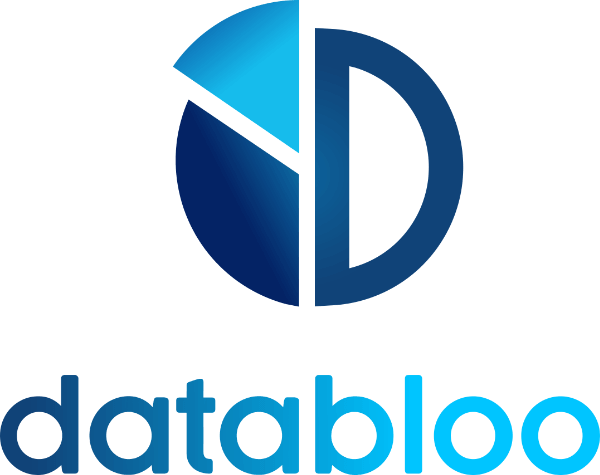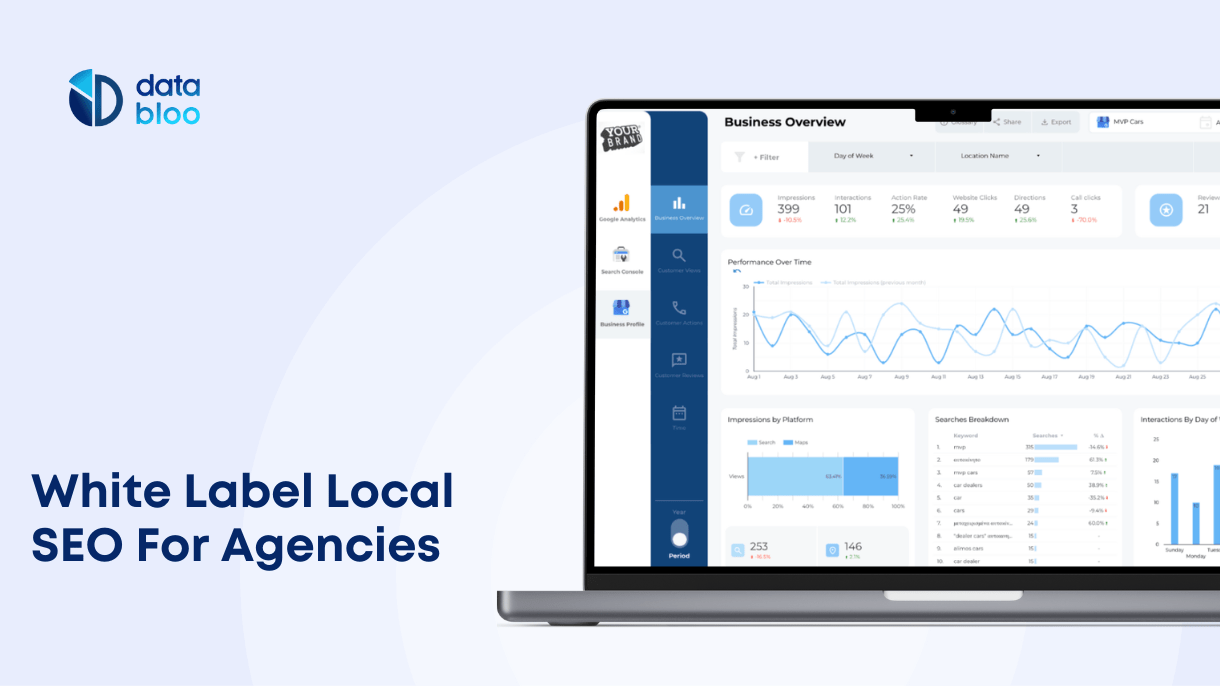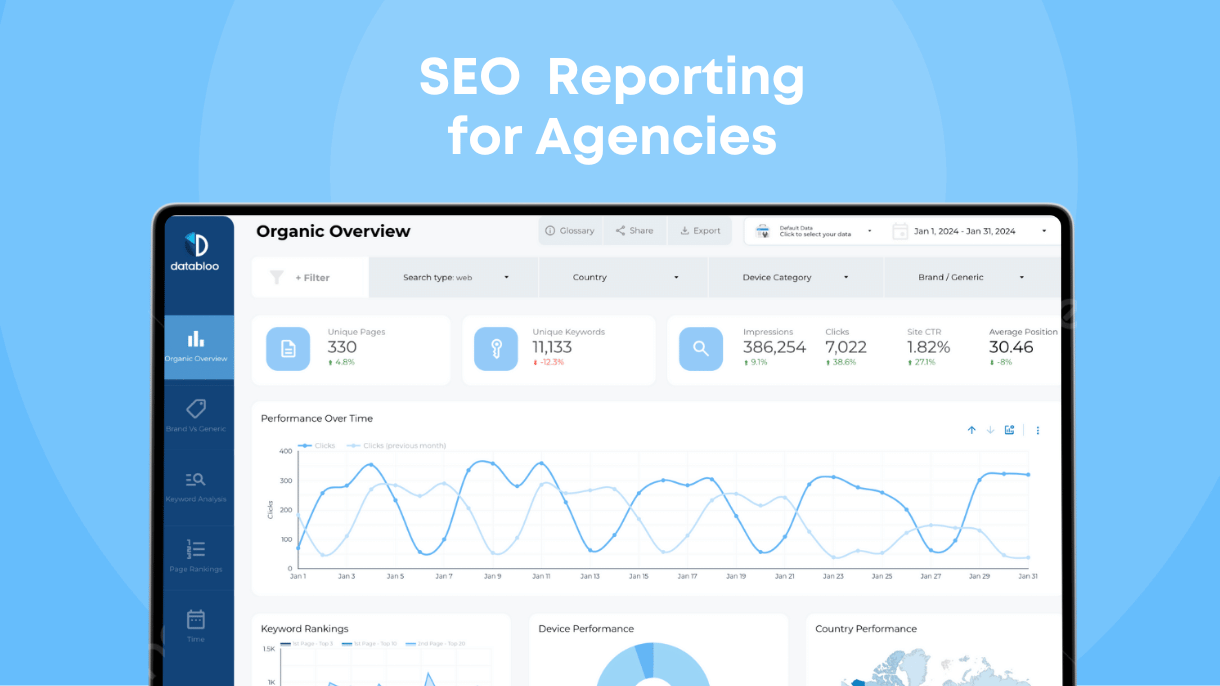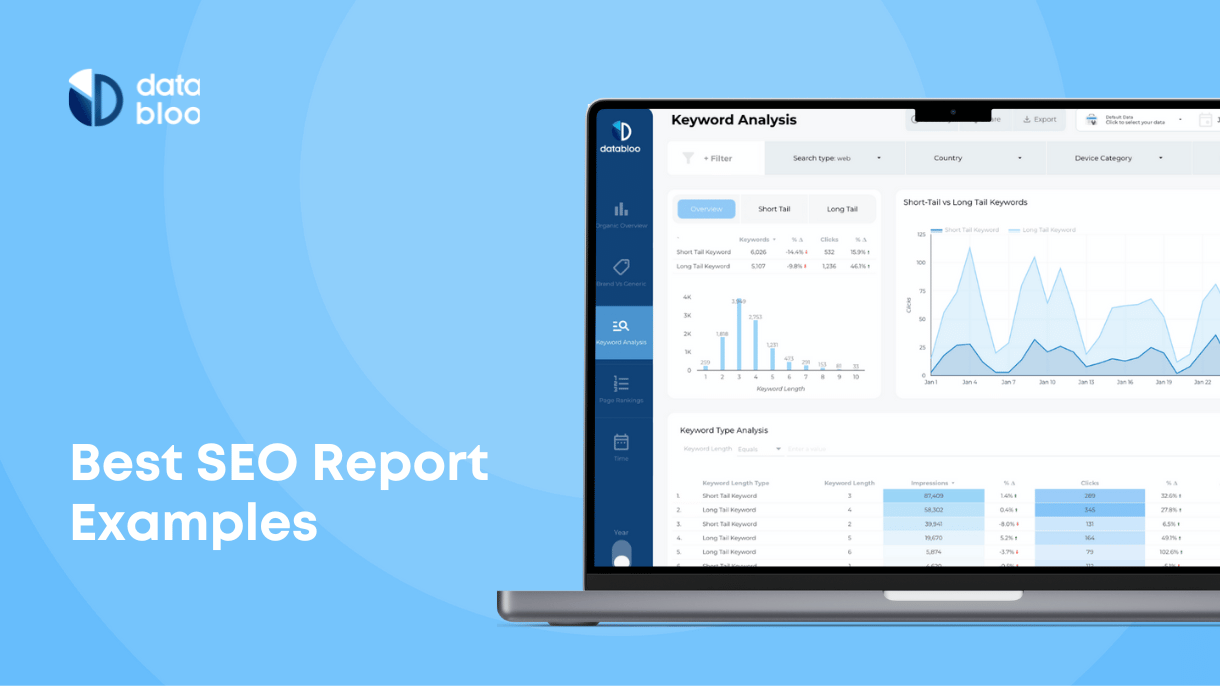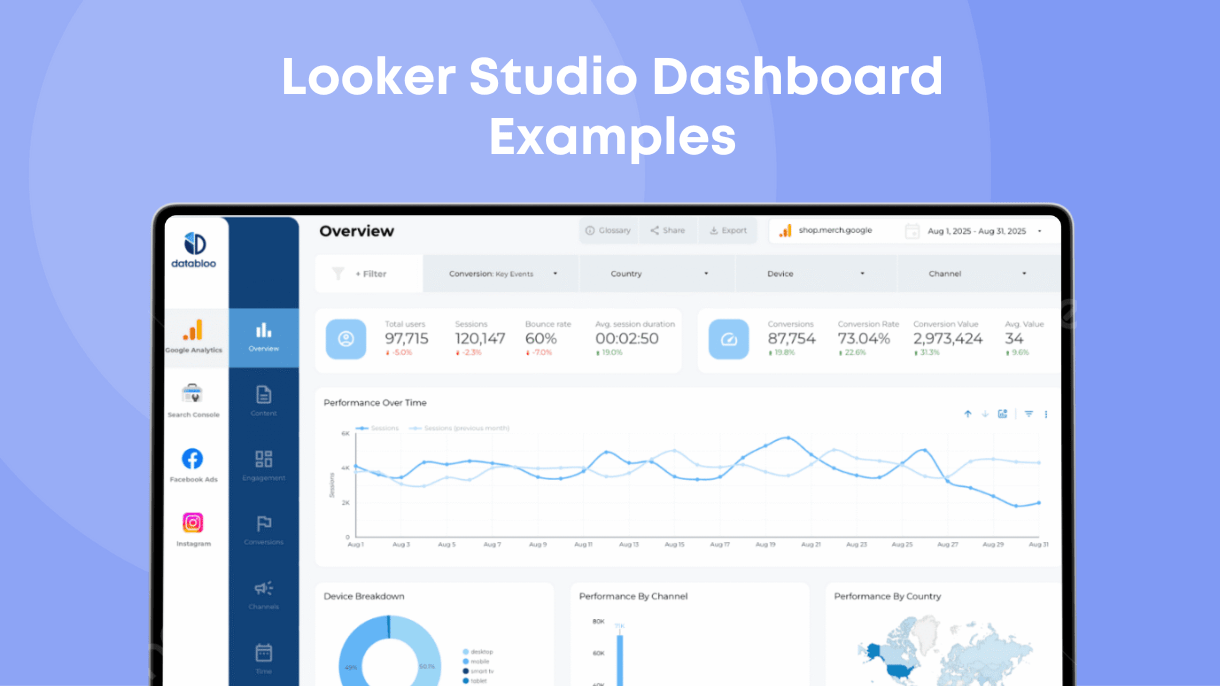Table of Contents
White label local SEO services for agencies are surging in popularity, but you always need to be on the lookout for the quality of what you get.
In this article we’ll walk you through the value of what white label local seo services for agencies, the spectrum of services offered, how to tell the good provider from a bad one, and tools essential for anyone who uses or provides white label local seo services.
Let’s dive in!
What Is White Label Local SEO?
White label is the practice when one party (a company, a contractor) produces a product or a service that another company rebrands and sells as their own.
Local SEO refers to the set of strategic optimizations of a business’s online presence to improve its visibility in local search results. For example, “pest control in Texas” or “spa salon near me”.
As such, white label local SEO entails outsourcing, rebranding, and then reselling of local SEO services by agencies.
Benefits Of White Label Local SEO For Agencies
Scalability
Outsourcing white label local SEO services to other agencies helps you focus more on generating agency client revenue while saving time on the demanding and ever-changing nature of local SEO.
Faster Service Delivery
Professional SEO agencies that focus on local SEO typically optimize their workflow to performance and speed. If you can find a trusted SEO partner, you will be able to ensure faster speed delivery to your clients without sacrificing quality of services.
Increased Revenue
Apart from allocating more time to generating revenue by outsourcing time-demanding SEO work, you can also expand the roster of services your agency offers and use local SEO services as a segue to more service upgrades such as link building, PR, and other SEO-related services.
Examples Of Local SEO Services
Local SEO is a multi-level discipline where you need to make several things right in order to build a lasting success.
As such, you can offer a wide variety of services that will vary from client to client.
Below are the most essential white label local SEO services your agency can provide or commission.
Google Business Profile Optimization
This service entails creating (or claiming), verifying, and optimizing a business’s profile for better visibility in local map packs.
Citation Building and Management
This service usually means making sure the business is featured on local directories (like Yelp, Bing Places) and local, specialized directories, as well as ensuring consistency of NAP (Name, Address, Phone) across several platforms.
Review Management
Reviews are not only important from brand perspective but also as one of the key aspects of local SEO performance, so managing reviews is a common sub-service to white labeled local SEO.
Local Keyword Optimization
Optimization of website pages for local search terms with local intent (e.g., “plumber in Austin”) on website pages and metadata.
Map Pack Ranking Strategies
Techniques to help the business appear in the top 3 local results on Google Maps.
Local Link Building
Earning backlinks from local blogs, news sites, and other appropriate online venues to improve local authority and local SEO rankings.
Monthly Local SEO Reports
Crucial part of any local SEO service and especially while labeling local SEO for agencies is robust SEO reporting workflow.
How to Market Your Local SEO Services
Inbound Marketing
Generate interest in your white labeled local SEO services by simply educating your readers about the benefits of local SEO through blog posts, social media, and newsletters.
Offer Free SEO Audits
As a marketing agency, it’s very handy to offer to your existing and new clients SEO audits – they don’t take much time to create – most of the SEO tools will provide a good baseline for reports that you can support with your own observations.
Local SEO clients are great candidates for audits because the value of local SEO can be illustrated very quickly by showing existing high-value searches for this particular client.
Upsell To Existing Clients
If you’re already working with a client who values your marketing efforts, upselling local SEO services can be easy if your client will benefit from them.
Feature Reviews
If your website has a testimonials section, you can always add a testimonial directly connected to local SEO results.
Challenges and Risks of White Labeling Local SEO And How to Navigate Them
Client transparency issues
Clients often assume all work is done in-house. If they discover a third-party provider is involved, the mutual trust can be damaged.
How to navigate: Be transparent in contracts that your team includes specialists and partners. Focus on outcomes, not on who does the task.
Branding confusion if mishandled
If reports or communications from the white label provider aren’t properly branded, clients may receive inconsistent or conflicting materials.
How to navigate: Choose a provider that fully supports while labeling and custom branding, review all deliverables before forwarding to clients.
Misaligned SEO practices with your agency’s values
Some white label providers may use tactics (like poor-quality backlinks or keyword stuffing) that don’t match your agency’s standards.
How to navigate: Vet providers thoroughly. Request samples, understand their strategies, and choose one whose practices reflect your commitment to ethical SEO.
How to Price White Label Local SEO Services
Cost-plus pricing model
The standard cost-plus model takes the cost charged by your white label provider and adds a markup (usually 30–100%). For example, if a review management or citations audit costs $200, you might charge $350–$400 to your client.
Best for: Agencies just starting out or working with a few trusted providers.
Tiered packages based on deliverables (e.g., citations, GMB management)
Create set packages (e.g., Standard, Premium) that include different levels of service — such as the number of citations, frequency of GMB optimization, or number of location pages optimized.
Best for: Agencies looking to scale and simplify the sales process.
Retainers vs. One-time projects
Decide early whether you’ll offer:
- One-time local SEO services (e.g., initial setup, citation building), or
- Monthly retainers that include ongoing services like reviews management, map pack tracking, and content updates.
Retainers are ideal for generating consistent revenue and long-term client relationships, while one-time projects can be priced higher for setup effort.
The Other Side: What to Look In a White Label Local SEO Provider
Choosing the right white label partner is crucial to your agency’s reputation and client satisfaction. Here’s what to look for:
1. Proven Local SEO Expertise
Make sure the provider has real experience with local SEO — including Google Business Profile optimization, local citations, and map pack rankings. Ask for case studies or sample reports.
Make sure to check the results with actual rankings, if possible. Inspect backlinks, citations, and etc. Make sure there is a proof of work for the mentioned accounts.
2. Fully White-Labeled Deliverables
Your provider should provide all deliverables as white labeled: customizable, white-labeled reports, dashboards, and communications so everything appears branded under your agency.
3. Transparent Communication & Reporting
Look for a partner who provides clear timelines, regular updates, and detailed reporting. Poor communication can reflect badly on your agency.
Communication practices start from the very first onboarding call, so be on the lookout for red flags early, such as: missed deadlines, irregular non-transparent communication, purposeless meetings, and change in agreements.
4. Ethical (No Black Hat) SEO Practices
Avoid providers who use spammy backlinks, keyword stuffing, or outdated SEO tricks. Choose one that follows Google’s guidelines and emphasizes long-term results.
A harmful SEO campaign can disrupt your client search performance and ruin your online reputation.
5. Flexibility and Scalability
The best providers adapt to your clients’ needs — whether it’s one-time audits, monthly retainers, or multi-location campaigns. They should be able to grow with your agency.
Tools Used in White Label Local SEO Campaigns
Traffic Analysis
For traffic analysis, the most commonly used tools are Google Analytics and Google Search Console.
Both tools are free to use.
Google Analytics provides insights into traffic composition, conversion, and customer behavior metrics such as devices used, demography, and time spent to your website ages.
Google Search Console focuses more on rankings and keywords that generate traffic to your website.
Rank Tracker
Rank trackers help you analyze how well you rank for specific keywords or groups of keywords.
Although Google Search Console always stores data about average ranking positions, the data is updated not in real-time and with a delay of a few days.
If you’re serious about local SEO performance tracking, invest in specialized rank tracker that will update keyword rankings frequently.
Data Bloo For Reporting
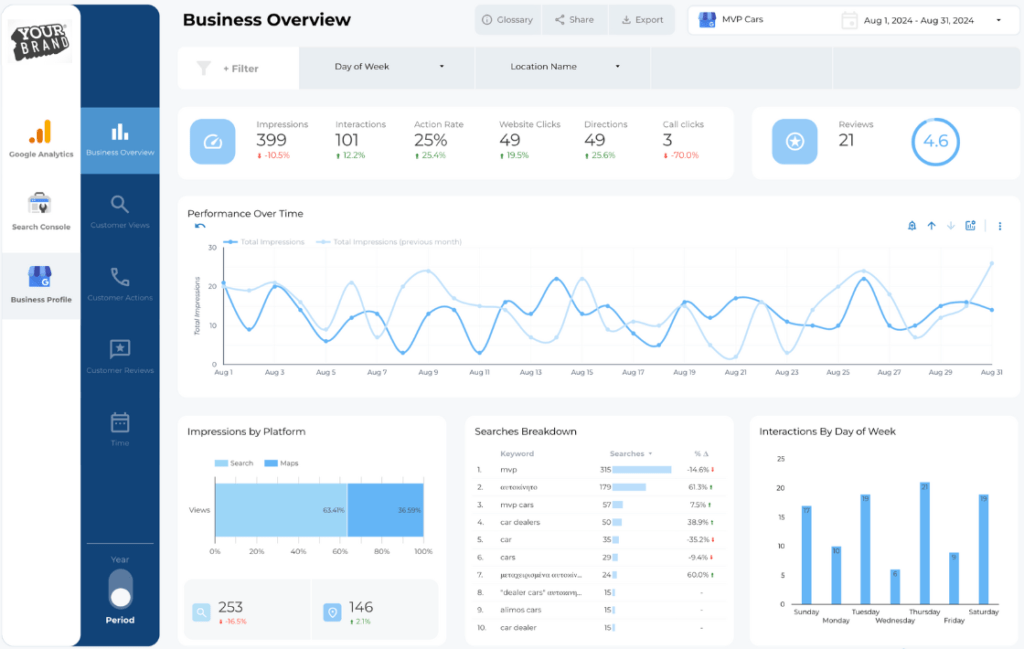
For while label local SEO reporting there’s no better solution than Data Bloo, a reporting tool built on top of Looker Studio.
Data Bloo reports are fully white labeled – you can change fonts, logos, and visuals.
It provides templates that are automatically populated with all necessary data for both client reporting and in-house reporting.
Unlike other similar tools, Data Bloo reports don’t require a monthly subscription – once you purchase them, you can use them for as many clients and projects as you want.
For local SEO white label agency reports, the two most appropriate Data Bloo templates are:
Local SEO Report Template – all-around local SEO report for agencies
Google My Business Report Looker Studio Template – focuses on GMB metrics
Custom Template – build a multi-channel report adjusted to your needs in a few minutes.
Each template comes with a fully functional free demo.
